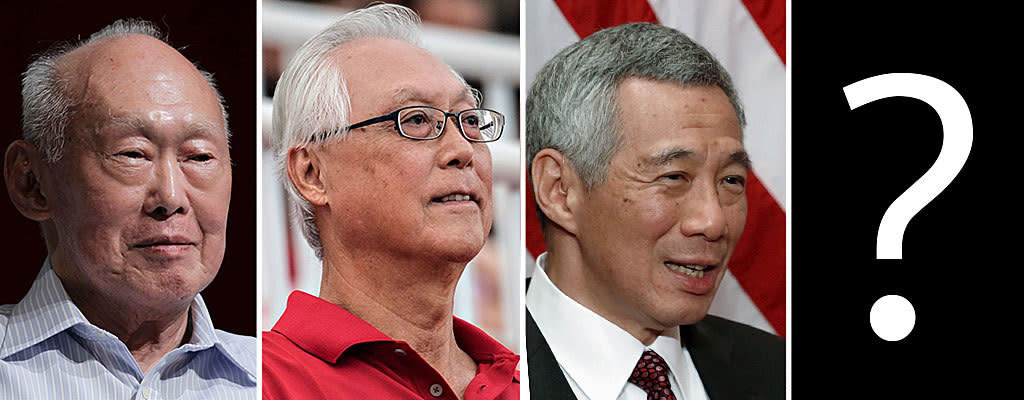Process of choosing Singapore Prime Minister should be more transparent: survey

(L-R) Lee Kuan Yew, Goh Chok Tong, Lee Hsien Loong. Photos: Yahoo Newsroom/Reuters
Nine in 10 people feel that the process of selecting Singapore’s next Prime Minister should be made more transparent, according to a survey conducted by market research consultancy Blackbox.
The representative survey of 897 Singaporeans, commissioned by Yahoo Singapore earlier this month, also showed that four in 10 respondents felt very strongly about it.
This was a sentiment that resonated across age and ethnic groups. For example, some 43 per cent of those aged 25-34 strongly agreed on the need for more transparency, while 40 per cent of those aged 50 and above also felt the same.
41 per cent of Chinese respondents felt the same way, followed by 40 per cent of Indians and 36 per cent of Malays.
Prime Minister Lee Hsien Loong has addressed the issue of leadership succession on multiple occasions, most recently in an interview with Beijing-based magazine Caijing this month.
Lee is expected to step down after the next General Election, which must by held by January 2021. He told Caijing, “It takes time, but I have a promising team of younger Ministers and I am quite sure from amongst them, one leader will emerge.”
Leadership renewal

Graphic: Blackbox
While Singapore has had three Prime Ministers from the ruling People’s Action Party in 57 years – the late Lee Kuan Yew, Goh Chok Tong and Lee Hsien Loong - little is known about the process of choosing one. In Singapore’s political system, the leader of the ruling party is the PM.
Lee Kuan Yew served from 1959 before making way in 1990 for Goh, who was previously Deputy PM and headed the defense, trade and industry, and health ministries.
Goh himself stepped down in 2004 for Lee Hsien Loong, who boasted a similar CV. He had also served as DPM and headed the defense, trade and industry, and finance ministries.
In countries such as the United Kingdom, political party leaders are chosen in an open election.
After David Cameron of the ruling Conservative Party stepped down as Prime Minister, party members who are elected MPs voted for Theresa May to replace him.
For the opposition Labour Party, all registered party members were able to vote in this month’s leadership election.
But the People’s Action Party only holds elections for its Central Executive Committee every two years, when party cadres vote in 12 members from a list of candidates. Up to six more members can be co-opted as well.
In a Straits Times (ST) commentary last month, editor at large Han Fook Kwang said, “(The process of leadership succession) shouldn’t also be such an opaque decision that no one knows what is happening until the succession announcement is made. Being more open and transparent would help Singaporeans understand better why a particular person was chosen and how the assessment was made.”
This drew a swift rebuke from PAP chairman Khaw Boon Wan, who is also Coordinating Minister for Infrastructure and Minister for Transport. In a letter to The Straits Times, Khaw claimed that the process is “anything but opaque”.
He added, “As with both ESM Goh Chok Tong and PM Lee Hsien Loong, the next prime minister will be chosen by the next generation of leaders from among themselves. If all goes well, they will make this choice by consensus. Older ministers, including the current PM, will stay out of the deliberations.”
Other survey findings
The Blackbox survey also found that 73 per cent of respondents did not feel that the race of the PM is an important criterion. More than half of all those polled also picked Deputy Prime Minister Tharman Shanmugaratnam as their top choice to become the next PM.
The survey also revealed that the topic of leadership succession is closely followed by Singaporeans, with seven in 10 respondents having recently heard or read news about the topic.


